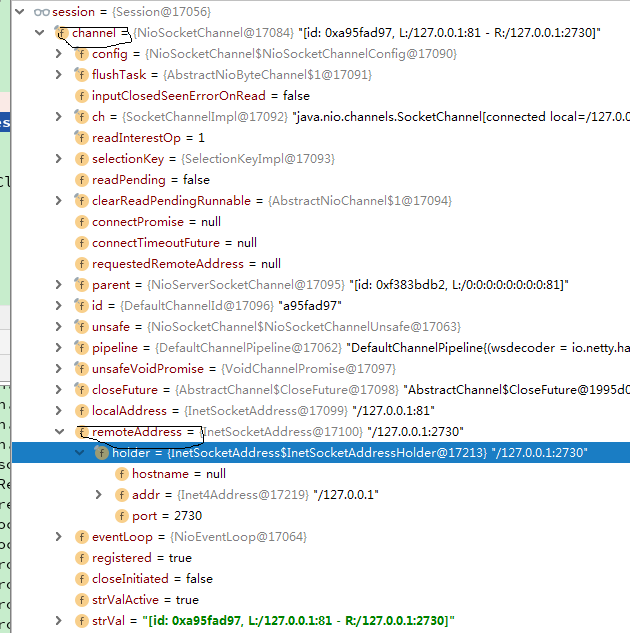一些场景中,我们要对websocket客户端的ip进行校验,如果是黑名单,或者不被允许的则不应该让他访问业务系统。
笔者本地使用了两个Websocket技术原型,一个基于Netty封装的Websocket框架:
表达式获得方法

因为使用Ognl解析对象时,会把对象数据放入一棵树,在任意调试窗口监控可以查看到类及属性的层次关系。
比如查询Ip地址,我们这里选择的树路径是
#root->channel->remoteAddress
他返回的对象时InetSocketAddress的实例,得到这个对象后,你可以调用
.getAddress().getHostAddress()
方法获得最终的ip真实地址,当然你也可以使用其他表达式来获得
#root.channel.remoteAddress.holder.addr.holder.hostName
#root.channel.remoteAddress.holder.addr.hostName
这些表达式需要你自己去评估计算。
import lombok.extern.slf4j.Slf4j; import ognl.DefaultMemberAccess; import ognl.Ognl; import ognl.OgnlContext; import ognl.OgnlException; import org.yeauty.pojo.Session; @Slf4j public final class NettyWebsocketHelper { private NettyWebsocketHelper() { } private static OgnlContext context = new OgnlContext(); /** * set DefaultMemberAccess with allowed access into the context */ static { context.setMemberAccess(new DefaultMemberAccess(true)); } public static String getRemoteAddress(final Session session) { //.getAddress().getHostAddress() //.holder.addr.hostName //.holder.addr.holder.address //.holder.addr.holder.hostName //return (String) eval(session,"#root.channel.remoteAddress"); return eval(session, "#root.channel.remoteAddress.getAddress().getHostAddress()", String.class); } public static <T> T eval(final Object source, final String expression, Class<T> targetClass) { try { return (T) Ognl.getValue(expression, context, source); } catch (OgnlException e) { log.error("评估表达式出错:{}", e); throw new IllegalAccessError("expression invalid"); } } public static Object eval(final Object source, final String expression) { Object value = null; try { value = Ognl.getValue(expression, context, source); log.info("return value :{}, class.name:{}", value, value.getClass().getName()); } catch (OgnlException e) { log.error("评估表达式出错:{}", e); } return value; } }
使用方法:
/*** * 登录ws服务器 * @param session * @param appId * @param apiKey * @throws InterruptedException */ private void onLogin(Session session, String appId, String apiKey) { String remoteAddress = NettyWebsocketHelper.getRemoteAddress(session); ApiService service = apiService.getService(appId, apiKey); if (Objects.isNull(service)) { session.sendText("appid无效"); session.close(); return; } final String serviceType = service.getServiceType(); final Integer serviceId = service.getId(); log.info("远程IP:{}正在尝试登录到api服务器", remoteAddress); if (!checkWhiteList(serviceId, remoteAddress)) { session.sendText("禁止调用API接口的IP:".concat(remoteAddress)); session.close(); return; } }
调用结果

2020-1-15日更新:
参考来源:https://stackoverflow.com/questions/22690907/client-socket-get-ip-java
/*** * 登录ws服务器 * @param session * @param appId * @param apiKey * @throws InterruptedException */ private void onLogin(Session session, String appId, String apiKey) { String ip = resolveRemoteIp(session.remoteAddress()); log.info("远程IP地址:{}",ip); } String resolveRemoteIp(SocketAddress socketAddress) { if (socketAddress instanceof InetSocketAddress) { InetAddress inetAddress = ((InetSocketAddress)socketAddress).getAddress(); if (inetAddress instanceof Inet4Address) { log.info("IPv4:{}",inetAddress); return inetAddress.getHostAddress(); }else if (inetAddress instanceof Inet6Address) { log.info("IPv6:{}",inetAddress); }else { log.error("Not an IP address."); return null; } } else { log.error("Not an internet protocol socket."); } return null; }